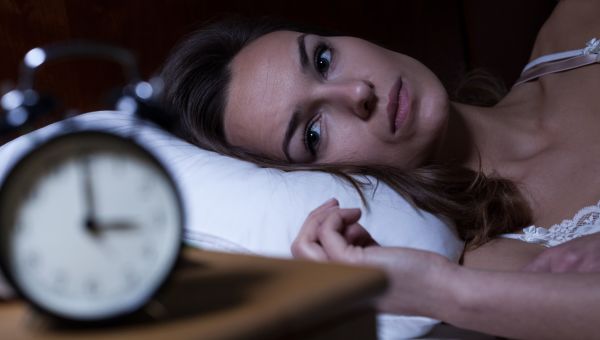Moody? Cranky? 7 odd reasons why
Find out how too much coffee, too little sleep, and other factors affect your outlook.
Updated on January 30, 2023

Feeling crabby? Your diet, lack of sleep, or circle of friends may be contributing. Luckily, there are sometimes simple fixes for a bad mood.
Larry Banta, MD, a psychiatrist at the West Valley Medical Center in Caldwell, Idaho, explains why we might be grouchy—and what we can do about it.

You Don't Get Enough Sun
Vitamin D is a hormone that your body makes when your skin is exposed to sunlight. You can also get the nutrient from eating certain foods. When you don’t get enough vitamin D, it can influence your frame of mind.
“Low vitamin D affects calcium levels in the blood, which can affect mood. An… Show More
Vitamin D is a hormone that your body makes when your skin is exposed to sunlight. You can also get the nutrient from eating certain foods. When you don’t get enough vitamin D, it can influence your frame of mind.
“Low vitamin D affects calcium levels in the blood, which can affect mood. An imbalance of calcium can make you feel a little depressed,” Dr. Banta says.
The fix: Fatty fish, like tuna and salmon, are good sources of vitamin D, but you can also get your daily intake from sunshine. About 15 minutes of direct exposure to the sun, without sunscreen, is all you need. Beyond those 15 minutes, remember to apply sunscreen to any areas of exposed skin.
Show Less
You Eat Food High in Added Sugar
Have you ever noticed that eating high-fat and high-sugar foods when you’re in a bad mood can make things seem worse? It’s true: There may be a connection between your diet and your emotional well-being. Studies suggest a correlation between a diet high in refined sugar and decreased brain function… Show More
Have you ever noticed that eating high-fat and high-sugar foods when you’re in a bad mood can make things seem worse? It’s true: There may be a connection between your diet and your emotional well-being. Studies suggest a correlation between a diet high in refined sugar and decreased brain function and worsening symptoms of depression.
The fix: Snack on lean proteins and healthy carbohydrates, like an apple and peanut butter or carrots and hummus. Try to limit or avoid sugar-filled foods and drinks like candy and soda.
Show Less
You're Dehydrated
If you wait until you’re thirsty to grab a glass of water, it may be too late. Even mild dehydration can adversely affect your energy and outlook. Research suggests your attitude deteriorates as your hydration level decreases. In fact, one small study, published in 2021 in Nutrients, found that… Show More
If you wait until you’re thirsty to grab a glass of water, it may be too late. Even mild dehydration can adversely affect your energy and outlook. Research suggests your attitude deteriorates as your hydration level decreases. In fact, one small study, published in 2021 in Nutrients, found that dehydration impaired both memory and mood. Water supplementation reversed the results, leading to improvements in processing speed, working memory, and mood.
The fix: Drink more water. Three liters (13 cups) of water a day should keep you hydrated if you’re a healthy adult male living in a temperate climate, according to the Institute of Medicine. For adult women, it’s 2.2 liters (9 cups). Everyone is different, however, and the key is maintaining proper hydration. If you’re properly hydrated, your pee should appear clear or light yellow, not dark yellow or brown.
Show Less
You Work Too Much
A job can offer benefits such as financial stability, personal growth, and social interaction, but working excessive amounts may not be healthy. Putting in overtime often leaves less time for leisure, friends, and family. A 2020 study published in PLoS One determined that long working hours (more… Show More
A job can offer benefits such as financial stability, personal growth, and social interaction, but working excessive amounts may not be healthy. Putting in overtime often leaves less time for leisure, friends, and family. A 2020 study published in PLoS One determined that long working hours (more than 31 to 40 hours per week) were associated with stress, depression, and suicidal ideation.
The fix: Simply working less may not be feasible for everyone with a mortgage, rent, bills to pay, and family members to support. If you can taper back your work hours, it’s worth trying to do so.
Even if you are strapped for free time, you can still ease some of the effects of overwork by carving out a little "me time” in your off hours. Try picking up a new hobby, joining a group, or journaling in your free time. The practice can help force you to concentrate on something else and refresh your mind.
Show Less
You Hang With a Negative Crowd
Negativity can be contagious. A defeatist coworker, nagging family member, or toxic partner can contribute to your foul mood—and you may not even realize it.
“Family conflict and a lack of a supportive social system—those kinds of things will predispose you even more to having an episode of… Show More
Negativity can be contagious. A defeatist coworker, nagging family member, or toxic partner can contribute to your foul mood—and you may not even realize it.
“Family conflict and a lack of a supportive social system—those kinds of things will predispose you even more to having an episode of depression,” Banta says.
In fact, a 2021 review in Frontiers in Psychology notes that emotional exchange can be triggered by simple facial expressions, indirect human interactions, or even by watching others' behaviors in direct and indirect interactions. The researchers also note that as humans, our bodies align physiologically and neurologically with others during interaction.
The fix: When you can, try to bring positivity to the conversation. Positive thinking has the potential to lower levels of stress and depression—and it may help lengthen your life, too.
Show Less
You Have Too Much Caffeine
Coffee certainly has its benefits: Studies suggest it may help prevent many diseases, such as type 2 diabetes and cardiovascular disease. For example, a review published in Trends in Cardiovascular Medicine in 2021 found that two to three cups a day of coffee was associated with beneficial effects… Show More
Coffee certainly has its benefits: Studies suggest it may help prevent many diseases, such as type 2 diabetes and cardiovascular disease. For example, a review published in Trends in Cardiovascular Medicine in 2021 found that two to three cups a day of coffee was associated with beneficial effects on diabetes and hypertension. It also found that coffee consumption reduced the risk of cardiovascular disease, coronary artery disease, arrhythmia, heart failure, and all-cause mortality.
But you can have too much of a good thing. While a cup or two in the morning may help protect against depression, people with sensitivity to caffeine or those who have consumed too much may experience worsening feelings of depression and anxiety. Plus, too much caffeine can disrupt your sleep, making you grumpy and amplifying these feelings.
The fix: Cut back on your caffeine consumption, certainly within six hours of bedtime. Try limiting yourself to one cup of coffee in the morning or switch to decaffeinated drinks in the afternoon. Green tea has less caffeine and an array of healthy antioxidants; it’s a great alternative.
Show Less
You Need Sleep
Sleep deprivation, even mild cases, can cause irritability, a short temper, and a susceptibility to stress. A 2019 study published in Journal of Experimental Psychology: General looked at participants who were told to either maintain or restrict their normal sleep by four hours each night over the… Show More
Sleep deprivation, even mild cases, can cause irritability, a short temper, and a susceptibility to stress. A 2019 study published in Journal of Experimental Psychology: General looked at participants who were told to either maintain or restrict their normal sleep by four hours each night over the course of two days. The study found that sleep restriction universally intensified anger, suggesting that sleep loss can contribute to mood dysregulation.
The fix: Luckily, a good night’s rest can help improve your mood. Aim to get between seven and nine hours of sleep each night, if you’re an adult between ages 18 and 64.
Show Less
When to See Your Healthcare Provider
A bad mood can be triggered by a number of things, like sleep, diet, the people around you, or changes in your hormones. But if you’re experiencing more than a fleeting feeling of sadness and you think you might have symptoms of depression, talk to your healthcare provider.
Worldwide,… Show More
A bad mood can be triggered by a number of things, like sleep, diet, the people around you, or changes in your hormones. But if you’re experiencing more than a fleeting feeling of sadness and you think you might have symptoms of depression, talk to your healthcare provider.
Worldwide, depression affects about 280 million people, and it can’t simply be treated with diet and better sleep. You may need to speak with a specialist about how you’re feeling, and in some cases, medical treatment may be necessary. “At a certain level, you really need medications to get a person out of suicidal thoughts or behaviors,” Banta says.
If your bad mood ever turns into thoughts of self-harm or suicide, don’t wait to tell someone. Contact a counselor right away or call the National Suicide Prevention Lifeline at 1-800-273-8255 or call, text, or chat to 988. A licensed mental health professional will listen and guide you in taking steps to stay safe.
Show Less
Cleveland Clinic. Vitamin D Deficiency. Last reviewed August 2, 2022.
Religi A, Backes C, et al. Estimation of exposure durations for vitamin D production and sunburn risk in Switzerland. Journal of Exposure Science & Environmental Epidemiology. 2019;29(6):742-752.
Eva Selhub. Nutritional psychiatry: Your brain on food. Harvard Health. Updated September 18, 2022.
Zhang J, Ma G, et al. Effects of Water Restriction and Supplementation on Cognitive Performances and Mood among Young Adults in Baoding, China: A Randomized Controlled Trial (RCT). Nutrients. 2021;13(10):3645.
Mayo Clinic. Water: How much should you drink every day? October 12, 2022.
Academy of Nutrition and Dietetics. How Much Water Do You Need? Published June 23, 2022.
Park S, Kook H, et al. The negative impact of long working hours on mental health in young Korean workers. Useche SA, ed. PLOS ONE. 2020;15(8):e0236931.
Herrando C, Constantinides E. Emotional Contagion: A Brief Overview and Future Directions. Frontiers in Psychology. 2021;12.
Mayo Clinic. Positive thinking: Stop negative self-talk to reduce stress. February 3, 2022.
American Heart Association. Is coffee good for you or not? Published 2018.
Chieng D, Kistler PM. Coffee and tea on cardiovascular disease (CVD) prevention. Trends in Cardiovascular Medicine. Published online August 2021.
Mayo Clinic. Does caffeine make depression worse? September 20, 2018.
Krizan Z, Hisler G. Sleepy anger: Restricted sleep amplifies angry feelings. J Exp Psychol Gen. 2019 Jul;148(7):1239-1250.
Suni E. How Much Sleep Do We Really Need? National Sleep Foundation. Published March 10, 2021.
Centers for Disease Control and Prevention. Sleep and Sleep Disorders: How Much Sleep Do I Need? Last reviewed September 14, 2022.
World Health Organization. Depression. Published September 13, 2021.
More On


video

article


video


video


video
